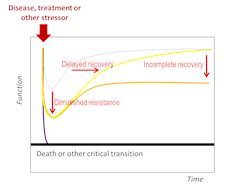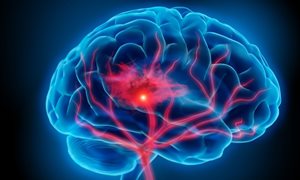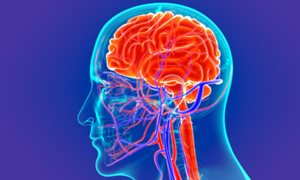
Medicine is unable to objectively assess how older adults will respond to health stressors imposed by disease or by its treatment. Clinicians are often surprised by patients who unexpectedly ‘bounce back’ despite several health deficits. Research in the Department of Geriatrics of the Radboudumc has explored how quantifying a patient’s physical resilience – the ability to resist functional decline and recover physical health following a stressor – can support clinical intuition and decision-making. The results of this study are published in Experimental Gerontology on April 13th.
The research focuses on validating several dynamic indicators of resilience for use in geriatric patients. These novel indicators, rooted in the study of complex systems, reflect key features hidden within easily obtainable physiological signals, like how complex the system is and how quickly it recovers after being disturbed.
As a first step, the heart rate and physical activity of 121 geriatric inpatients using a wearable sensor is continuously monitored. Subsequently, these putative resilience indicators are extracted. They examined the association of each indicator with measures of health functioning as a proxy for resilience.
 The authors found that more complex and variable activity was associated with lower frailty and fewer limitations to activities of daily living. Importantly, they found that certain indicators capture resilience in terms of stability and others in terms of adaptability. Thus, it is essential to the use and interpretation of the indicators to consider whether the system under study functions optimally when kept stable (e.g., blood pressure) or is allowed to be flexible (e.g., heart rate).
The authors found that more complex and variable activity was associated with lower frailty and fewer limitations to activities of daily living. Importantly, they found that certain indicators capture resilience in terms of stability and others in terms of adaptability. Thus, it is essential to the use and interpretation of the indicators to consider whether the system under study functions optimally when kept stable (e.g., blood pressure) or is allowed to be flexible (e.g., heart rate).
They will use the lessons learned to develop a framework to help clinicians take advantage of resilience monitoring in older adults.
Publication
Rector, J. L., Gijzel, S. M. W., van de Leemput, I. A., van Meulen, F. B., Olde Rikkert, M. G. M., & Melis, R. J. F. (2021). Dynamical indicators of resilience from physiological time series in geriatric inpatients: Lessons learned. Exp Gerontol, 111341. doi:10.1016/j.exger.2021.111341
Related news items

Milk fat to attenuate obesity-related neurological co-morbidities
18 November 2021 The use of lipids to attenuate co-morbidities of obesity may sound paradoxical. However, it has shown to be particularly relevant in the fight against a less familiar co-morbidity of obesity, as it can induce alterations in white matter tracks, neuroinflammation and increases the risk of dementia. go to page
Early stage biomarker for Alzheimer's disease
4 November 2021 Researchers from the translational metabolic lab and department of neurology, in collaboration with researchers from University of Barcelona, set out to research a new biomarker in cerebrospinal fluid called “neuroleukin” for Alzheimer's disease. go to page
Palliative care for people with Parkinson’s Disease and their family Caregivers Current state of affairs
7 October 2021 Advanced stage Parkinson’s disease can cause a variety of symptoms, for which palliative care can be beneficial, though research from the point of view of patients in later stages is still rare. Radboudumc researchers therefore placed their patients perspectives at the center of their recent study. go to page
Radboudumc to lead research team into tackling future pandemics NWO funds complexity research on pandemics
5 August 2021 The Radboudumc is going to lead a study on how to deal with future pandemics, together with Radboud University and the University of Amsterdam. Rick Quax from the Informatics Institute/IAS is involved in this project. go to page

